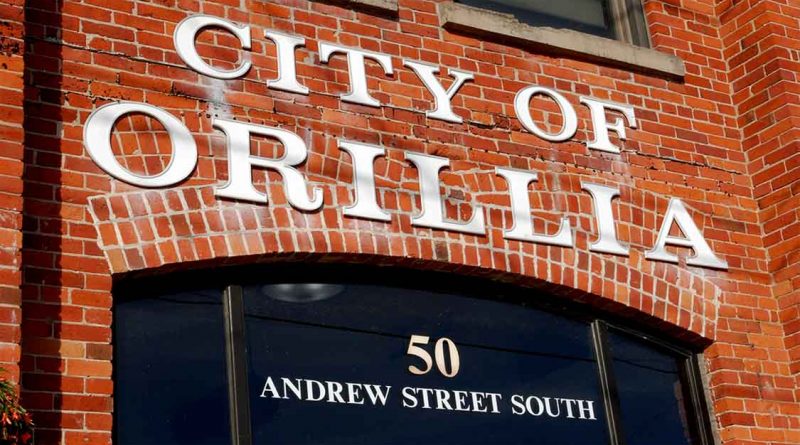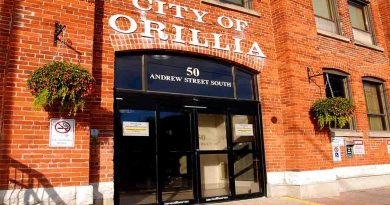Council Preview
By John Swartz
Orillia council’s Monday meeting schedule begins with a closed session, as is usually the case during weeks committee meetings are held. There are two items on the agenda. One is to deal with a settlement agreement with Metro Ontario Real Estate Ltd. This is to do with the Metro grocery store on Front Street with which both parties have sued each other over the terms of the lease and roof repairs.
Vaccination Proof
The other is labeled COVID-19 prevention policy. This is also on the committee agenda when council goes public at 4 p.m. Regarding that, a new section of policy is proposed which will affect all employees, council members, and those who sit on boards and committees. Council will also be taking an unusual move to delegate authority to the CAO to amend policy “as required because of new information or changing provincial or federal requirements.”
They are doing this on the recommendation of the Simcoe Muskoka District Health Unit, which was aimed at all employers, to have a workplace vaccination policy. The province authorized people provide vaccination proof (and subsequent doses if available and recommended) and photo ID to use public facilities (the rec center, theaters, etc.).
The part of the report referring to employees will require proof of vaccination, or be tested every other day effective November 15.
It is possible the reason this item is on the closed agenda is because of union contracts.
Nice Property Tax You Have There
Part of the process for levying property taxes each year is for council to endorse the ratios between property classes, which has been done. But, the province also gave the ability for municipalities to create a new small business property tax class. Council asked for the treasury to report the effect this would have if Orillia created a new class, instead of just doing so at budget earlier this year.
Part of the reason why council did not make this move already is because currently municipalities get their property valuations and classifications from MPAC and to create a new class under the commercial and/or industrial classification; the province left it up to municipalities to define what properties qualify and how much the tax rate will be.
Staff are saying this is not something the City has the data or experience with since property taxation was changed by the provincial government under Mike Harris. It is also likely municipalities do not have staff to take on this new function, and indeed the province requires municipalities have an administrator for this program.
Municipalities are able to discount the parent commercial or industrial; class tax rate by up to 35% and in the case of landlords, require tax savings be passed on to tenants.
So while Harris took away the entire functioning of assessing properties and administering the details of property taxation, the province is now throwing back a chunk to municipalities which have to determine which properties qualify under what conditions (a big business with revenues in the multi-millions can operate out of a very small property, many businesses are tenants and not property owners, so a low revenue business could be operating in a large building/property, etc.) and those rules will in all likelihood be different from neighboring municipalities creating advantages and disadvantages for business and communities based on boundary lines.
The one benefit, and some could argue the only benefit, of the province unilaterally taking property taxation administration away from municipalities was each municipality had the same rules as others. Under this situation a hodgepodge of different rules will likely develop.
Staff suggest rather than create a new class Orillia might do what others have done to create new tax bands, which may be less headache and provide stability for taxpayers. Staff also say setting the criteria is important and should not stray too far from information available from MPAC because setting other criteria can create more work than it’s worth.
The province is also requiring municipalities create appeals authorities separate from what property owners are familiar with and from provincial operation (i.e. funding).
Discounting property taxes in this manner will affect revenue and cities will still have to get the money to operate. Staff are essentially saying other tax class rates will have to change, go up, to compensate for creating a new class with lower rates. They also say the number of taxpayers facing higher bills outnumber those they suspect will get a reduction under this scheme.
There are a number of deadlines imposed by the province, yet staff believe implementing a new class won’t happen until 2023 because of all the moving parts to consider. It will definitely cost Orillia to create a new class and it starts right away with a request for $50,000 to hire a consultant.
The report’s suggested course of action for council are, top of the list, to receive the report – which means do nothing. The second choice is to move ahead and staff is not recommending this saying there is no consensus among municipalities the program is even viable, impractical and the information needed on properties to make a new class does not exist. Staff also say the current commercial banding Orillia has already comes with a 47% discount, which is better than the new program.
They also say decisions to create a new class have long-term effects which need to be investigated and modeled in order for the municipality to not shoot itself in the foot by overlooking all potential outcomes. The strongest argument come for staff’s estimate that the shortfall could be as high as $4 million which will have to be put on other classes and would have the effect of raising taxes on those properties by 6.25%.
Another effect of this program is education taxes would be correspondingly reduced, subject to the whim of the minister of finance.
Mariposa Grants
Last May the Mariposa folk Festival proposed a plan for the 2021 funding received from the City. Of course the festival did not happen this year. The festival has an agreement with the City for funding over a number of years and includes an additional $10,000 for the 60th anniversary which was to be in 2020. The latter was deferred to 2021 and the MFF is proposing it be deferred indefinitely (likely in case a festival doesn’t happen in 2022).
The MFF is also requesting the $50,000 annual grant for 2021 be redirected to help fund planned improvements to Tudhope Park. Council budgeted $50,000 and $10,000 for 2021. Staff recommend transferring $20,000 to the Tudhope Park capital project, and sending the remaining $30,000 plus the $10,000 to reserves at year end as it normally does with unspent money budgeted for operations or projects.
The motion recommends next year’s budget be as per the agreement, $50,000, and the $10,000 anniversary grant be included in budget requests for 2022.
Building Hope, Signs And Other Things
Part of the funding for the Lighthouse included a $2.7 million, interest free construction loan from the County, which was to be replaced at some point by a commercial loan when the project was completed. Since then the County decided to not require Lighthouse get another loan to cover the County’s. It’s on council’s agenda because a clause in title to the property gives the City right of approval for any changes in the title. The title will be changing to accommodate the County’s interest in the property now and council must agree.

Staff are asking council for approval to proceed with installing highway signs to replace ones currently welcoming visitors to Orillia. Council approved a $250,000 budget for 5 small signs at key entry points – two of which would have digital components, and $350,000 for two large signs for Highway 11 – both digital.
MTO will not allow digital signs near provincial highways, so digital signs are out. Staff was waiting for word from the ministry. Staff also say non-digital signs will be less expensive, but they have not got current pricing, which they believe will be somewhat higher, but lower than digital, than prices they have from prior to the pandemic.
Councillor Rob Kloostra has an enquiry motion to have staff report on the feasibility of installing all way stop signs at Rose Avenue and Westmount Drive (the crest of the hill).
Also scheduled is a special meeting of council to follow the committee meeting. This relates directly to the closed session items, which indicates some part of the decision regarding the Metro store needs a formal vote right away and the decisions made about vaccination requirements needs quick ascendency. Curiously though, the report from the just finished committee meeting is also on the agenda, which breaks the traditional one week cooling off period between committee and regular council meetings.
![]()



![]()
The regular council meeting is a video conference and the chamber is closed to the public. The public can watch it live on Rogers TV.
(Photo by Swartz – SUNonline/Orillia; Image Supplied)




